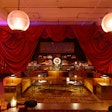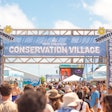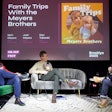
Title: President
What She Plans: More than 40 events each year, 20 of which are in the five days of the Tribeca Film Festival, such as the festival’s opening night party, film premieres, and press conferences. While award shows like the Independent Feature Project’s Gotham awards, the Director’s Guild of America Honors, and the Fragrance Foundation’s Fifi awards are the company’s “bread and butter,” Dalzell says, the company also does a couple of small and large corporate conferences each year—but with an avant-garde style. For a scientific conference in 2002, for example, Dalzell created a field of grass on which a speaker stood to deliver his talk on a biology theme.
Staff: Eight full-time staffers
Budget: “A wide range.”
How Long She Has Been at Dalzell Productions: Nine years
Career Path: After getting her B.A. in English from St. Francis Xavier University in Nova Scotia, Dalzell started working in theater in Canada before becoming the director of the Ottawa International Jazz Festival for five years. Dalzell then moved to New York and worked in experimental theater. “Then I got tired of eating spaghetti and started to get more serious and started producing events for people. The IFP was my first client and I was rolling in six months.”
Age: “Do I really have to tell you this? I am not yet 40.”
Where She Lives: SoHo
Where She Grew Up: Nova Scotia and Ottawa
Where She Goes For Ideas: “Brainstorming with the staff, magazines, TV shows, riding my bike around the city every single day. I’ll think, wow, why don’t we do something on that street, it’ll be fantastic. I rode my bike past Pier 25 and that is how I thought to use it for the Tribeca Film Festival drive-in movies.”
Biggest Challenge: “Building the business. I want a good vibe in the office—and to make money.”
Best Tip: “Do your own thing.”
Favorite Venue: “I like undiscovered locations that no one has ever done an event at before.”
Favorite Drink: Red wine
Favorite Magazine: Paper
Favorite Book: “I read a book a week. I don’t have a favorite.”
Favorite Band: “We listen to new music here every day. There is a constant soundtrack going on.”
Favorite New York Neighborhoods: SoHo and TriBeCaWhat.phpects of event planning does your company cover?
We do everything for clients, so we have a holistic view. We’re not just sets and lights and sound—we also do your box office and your tickets and your program book and your video production for your tributes. That is how we like to work. We are less interested in doing piecemeal. We don’t want to just do your box office. We are all on the ADD side. The more we have to do, the better we are. Boredom is the death of an event staff.
What.phpects of event planning does your company cover?
We do everything for clients, so we have a holistic view. We’re not just sets and lights and sound—we also do your box office and your tickets and your program book and your video production for your tributes. That is how we like to work. We are less interested in doing piecemeal. We don’t want to just do your box office. We are all on the ADD side. The more we have to do, the better we are. Boredom is the death of an event staff.
You attribute a large amount of your success to your staff. How do they affect the business
It is a pretty creative operation and we have a lot of young staff. Almost everyone on staff comes from an avant-garde, experimental theater background. Because of that we are able to work within extremely tight budgets and it looks incredible.
I have three senior producers [Joshua Cicerone, Michelle Stern, and Keith Geller], who work with me on a full-time basis. They each have a particular set of skills. One is incredibly good on the creative side, one is incredibly good at technical stuff, one is incredibly good at working with clients and people. I was able to take off four months after the birth of my twins because I have absolute faith in what these guys do here. We are able to grow even faster because they can handle things. Now that I have senior producers, my primary role is new business development.
How do you measure the success of an event?
A happy client, budget on track, and repeat business.
What is the most important.phpect of an event?
Location means a lot to events. You have to really explore your environment and understand that there are ways to make an unusual location work. We’re very interested in guests having an experience, not just attending something. Anyone can go to a party, but you want them to have some sort of reaction or experience.
How does new technology affect the way you plan events?
I love technology. I love new gadgets. I am always keen on trying new video, new lighting, new projections, new communication devices—if they enhance the project and we can afford it. We used new technology to improve the sound of the drive-in movies on Pier 25 for the Tribeca Film Festival. [Independent production manager] Jared Siegel found a professor of sound engineering who worked on it for weeks, coming up with a system just for us.
But we also do old school. We are not afraid to make signs with markers for people to hold up directing people “this way”—and sometimes that is more effective, because there is human contact.
How do you deal with budget issues?
Every budget is a challenge. We are obsessed with budgets. I spend half my day talking to clients about numbers, what I’m spending it on and why. We often do a lot on very little. You have to be very clear. For the opening night party for the Tribeca Film Festival in 2004, the sponsor, South African Tourism, had a grandiose vision but had a very strict budget. We couldn’t build 20 African huts, but we could build a sense of that in the space. We did two pointed performances instead of 10. Clients often need help defining goals and visions, so we come up with options at different budgets and present them to them.
What event are you looking forward to planning next year?
The Tribeca Film Festival, because we have worked on it since its inception and have a strong personal connection to it on all levels. We don’t sleep for months, but we feel lifted after doing it.
Describe what it is like working on the special events for the Tribeca Film Festival.
In January a small core starts working on it, and by February we are going. But we are always thinking about it on all levels—production, location, staffing—because it is such a big event.
For the 2004 festival, I was eight and a half to nine months pregnant, so Joshua [Cicerone] was the senior producer. The festival is 20 events in five days, and every day is different. The budget is extremely tight because it is nonprofit. We do single events at a higher budget than all of the Tribeca events combined. The redevelopment of downtown, that energy continues to this day. We really feel like we participated in the growth of that.
What are the challenges of working on a new festival like this one?
The very first year the challenge was time. It all happened in 100 days from inception to completion. And money. But those are the same challenges for every event. It was an unknown event, but I had absolute confidence it was going to be a success, and it was exactly what downtown needed.
How do you put together events that will get attention for the festival?
The festival has its own attention, so it’s not very hard. Celebrities make the events popular. We try to support the initiatives of the festival, such as developing a strong, creative film festival, by doing something no one has ever done before and [that involves] the community, such as the drive-in movies. Jane Rosenthal and Robert De Niro are the creative direction behind the festival. It was Jane’s creative vision for an opening night party and world premieres for the first year. Steven Rubenstein does the press for the whole festival and the special events. It is a team effort all around. We are only one piece of a very large puzzle.
What new challenges are you undertaking?
We are shooting and producing a short film. It’s directed by a friend of one of our senior staff, who brought the project in. We’ve never done a film before, and everyone here was interested in producing a film, so we decided to take it on. We want to keep everyone interested in things they find fascinating and let them get their feet wet. I’m willing to go there if we can figure it out financially and it won’t be a huge burden to the company. It’s worth doing if it makes them happy and they have fun. A lot of these projects are a lot of hours, so you want there to be things that they really want to do.
—Ellen Sturm Niz
Photo: Dan Hallman for BiZBash
This story originally appeared in the December 2004/January 2005 issue of the BiZBash Event Style Reporter.
What She Plans: More than 40 events each year, 20 of which are in the five days of the Tribeca Film Festival, such as the festival’s opening night party, film premieres, and press conferences. While award shows like the Independent Feature Project’s Gotham awards, the Director’s Guild of America Honors, and the Fragrance Foundation’s Fifi awards are the company’s “bread and butter,” Dalzell says, the company also does a couple of small and large corporate conferences each year—but with an avant-garde style. For a scientific conference in 2002, for example, Dalzell created a field of grass on which a speaker stood to deliver his talk on a biology theme.
Staff: Eight full-time staffers
Budget: “A wide range.”
How Long She Has Been at Dalzell Productions: Nine years
Career Path: After getting her B.A. in English from St. Francis Xavier University in Nova Scotia, Dalzell started working in theater in Canada before becoming the director of the Ottawa International Jazz Festival for five years. Dalzell then moved to New York and worked in experimental theater. “Then I got tired of eating spaghetti and started to get more serious and started producing events for people. The IFP was my first client and I was rolling in six months.”
Age: “Do I really have to tell you this? I am not yet 40.”
Where She Lives: SoHo
Where She Grew Up: Nova Scotia and Ottawa
Where She Goes For Ideas: “Brainstorming with the staff, magazines, TV shows, riding my bike around the city every single day. I’ll think, wow, why don’t we do something on that street, it’ll be fantastic. I rode my bike past Pier 25 and that is how I thought to use it for the Tribeca Film Festival drive-in movies.”
Biggest Challenge: “Building the business. I want a good vibe in the office—and to make money.”
Best Tip: “Do your own thing.”
Favorite Venue: “I like undiscovered locations that no one has ever done an event at before.”
Favorite Drink: Red wine
Favorite Magazine: Paper
Favorite Book: “I read a book a week. I don’t have a favorite.”
Favorite Band: “We listen to new music here every day. There is a constant soundtrack going on.”
Favorite New York Neighborhoods: SoHo and TriBeCaWhat.phpects of event planning does your company cover?
We do everything for clients, so we have a holistic view. We’re not just sets and lights and sound—we also do your box office and your tickets and your program book and your video production for your tributes. That is how we like to work. We are less interested in doing piecemeal. We don’t want to just do your box office. We are all on the ADD side. The more we have to do, the better we are. Boredom is the death of an event staff.
What.phpects of event planning does your company cover?
We do everything for clients, so we have a holistic view. We’re not just sets and lights and sound—we also do your box office and your tickets and your program book and your video production for your tributes. That is how we like to work. We are less interested in doing piecemeal. We don’t want to just do your box office. We are all on the ADD side. The more we have to do, the better we are. Boredom is the death of an event staff.
You attribute a large amount of your success to your staff. How do they affect the business
It is a pretty creative operation and we have a lot of young staff. Almost everyone on staff comes from an avant-garde, experimental theater background. Because of that we are able to work within extremely tight budgets and it looks incredible.
I have three senior producers [Joshua Cicerone, Michelle Stern, and Keith Geller], who work with me on a full-time basis. They each have a particular set of skills. One is incredibly good on the creative side, one is incredibly good at technical stuff, one is incredibly good at working with clients and people. I was able to take off four months after the birth of my twins because I have absolute faith in what these guys do here. We are able to grow even faster because they can handle things. Now that I have senior producers, my primary role is new business development.
How do you measure the success of an event?
A happy client, budget on track, and repeat business.
What is the most important.phpect of an event?
Location means a lot to events. You have to really explore your environment and understand that there are ways to make an unusual location work. We’re very interested in guests having an experience, not just attending something. Anyone can go to a party, but you want them to have some sort of reaction or experience.
How does new technology affect the way you plan events?
I love technology. I love new gadgets. I am always keen on trying new video, new lighting, new projections, new communication devices—if they enhance the project and we can afford it. We used new technology to improve the sound of the drive-in movies on Pier 25 for the Tribeca Film Festival. [Independent production manager] Jared Siegel found a professor of sound engineering who worked on it for weeks, coming up with a system just for us.
But we also do old school. We are not afraid to make signs with markers for people to hold up directing people “this way”—and sometimes that is more effective, because there is human contact.
How do you deal with budget issues?
Every budget is a challenge. We are obsessed with budgets. I spend half my day talking to clients about numbers, what I’m spending it on and why. We often do a lot on very little. You have to be very clear. For the opening night party for the Tribeca Film Festival in 2004, the sponsor, South African Tourism, had a grandiose vision but had a very strict budget. We couldn’t build 20 African huts, but we could build a sense of that in the space. We did two pointed performances instead of 10. Clients often need help defining goals and visions, so we come up with options at different budgets and present them to them.
What event are you looking forward to planning next year?
The Tribeca Film Festival, because we have worked on it since its inception and have a strong personal connection to it on all levels. We don’t sleep for months, but we feel lifted after doing it.
Describe what it is like working on the special events for the Tribeca Film Festival.
In January a small core starts working on it, and by February we are going. But we are always thinking about it on all levels—production, location, staffing—because it is such a big event.
For the 2004 festival, I was eight and a half to nine months pregnant, so Joshua [Cicerone] was the senior producer. The festival is 20 events in five days, and every day is different. The budget is extremely tight because it is nonprofit. We do single events at a higher budget than all of the Tribeca events combined. The redevelopment of downtown, that energy continues to this day. We really feel like we participated in the growth of that.
What are the challenges of working on a new festival like this one?
The very first year the challenge was time. It all happened in 100 days from inception to completion. And money. But those are the same challenges for every event. It was an unknown event, but I had absolute confidence it was going to be a success, and it was exactly what downtown needed.
How do you put together events that will get attention for the festival?
The festival has its own attention, so it’s not very hard. Celebrities make the events popular. We try to support the initiatives of the festival, such as developing a strong, creative film festival, by doing something no one has ever done before and [that involves] the community, such as the drive-in movies. Jane Rosenthal and Robert De Niro are the creative direction behind the festival. It was Jane’s creative vision for an opening night party and world premieres for the first year. Steven Rubenstein does the press for the whole festival and the special events. It is a team effort all around. We are only one piece of a very large puzzle.
What new challenges are you undertaking?
We are shooting and producing a short film. It’s directed by a friend of one of our senior staff, who brought the project in. We’ve never done a film before, and everyone here was interested in producing a film, so we decided to take it on. We want to keep everyone interested in things they find fascinating and let them get their feet wet. I’m willing to go there if we can figure it out financially and it won’t be a huge burden to the company. It’s worth doing if it makes them happy and they have fun. A lot of these projects are a lot of hours, so you want there to be things that they really want to do.
—Ellen Sturm Niz
Photo: Dan Hallman for BiZBash
This story originally appeared in the December 2004/January 2005 issue of the BiZBash Event Style Reporter.



















